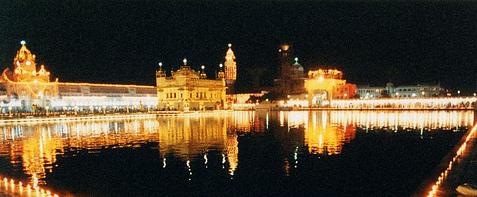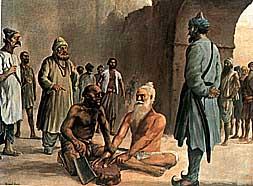The Muslim Emperor Jahengir approached Guru
Hargobind Ji upon his entering Gwalior and told the Guru
to denounce his Sikh religion and to join the Muslim faith.
With the intention of utilizing the Guru’s great strength
and fearlessness needed in battles. Being outraged by this
request, the Guru rejected his proposition.
Jahengir imprisoned the Guru and 52 Kings.The Emperor
ruled India at this time. The Asian Indians begged the Emperor
to release the Guru and the Emperor agreed but the Gurus
said also release the kings. Guru ji had a gown made with
52 string pieces for the Hindus to hold.
The Guru and the Hindu kings were
also freed at Diwali. Sikhs were very happy when
their leader was released. Guru Hargobind Sahib went to
the Golden Temple Amritsar in the Punjab. Sikh Diwali is
recalled throughout India and in many countries; each year
to remember Guru ji's release

To commemorate his undying love for Sikhism, the townspeople
lit the way to, Harmandhir Sahib (referred to as the Golden
Temple), in his honour.
Martyrdom of Bhai
Mani Singh Ji- The martyrdom in 1734 of
the elderly Sikh scholar and strategist Bhai Mani Singh,
the Granthi (priest) of Harmandir Sahib (Golden Temple).
He had refused to pay a special tax on a religious meeting
of the Khalsa on the Divali day. This and other Sikh martyrdoms
gave further momentum to the Khalsa struggle for freedom
and eventually success in establishing the Khalsa rule north
of Delhi

Bhai Mani Singh was a great scholar and he transcribed
the final version of Guru Granth Sahib upon dictation from
Guru Gobind Singh Ji in 1704. He took charge of Harmandir
Sahib's management on 1708. In 1737, he received permission
from Mughal governor of Punjab, Zakarya Khan for celebrating
Divali at Golden Temple for a massive tax of Rs. 5,000 (some
authors say it was Rs 10,000). Invitations were sent to
the Sikhs all over India to join Bandi Chhorh Diwas celebrations
at Harmandir Sahib. Bhai Mani Singh thought he would collect
the tax-money from the Sikhs as subscriptions who would
assemble for the purpose of Divali Celebrations. But Bhai
Mani Singh Ji later discovered the secret plan of Zakarya
Khan to kill the Sikhs during the gathering. Bhai Mani Singh
Ji immediately sent message to all the Sikhs not to turn
up for celebrations. Bhai Mani Singh could not manage to
arrange the money to be paid for tax. Zakariya Khan was
not happy about the situation and he ordered Bhai Mani Singh's
assassination at Lahore by ruthlessly cutting him limb-by-limb
to death. Ever since, the great sacrifice & devotion
of martyr Bhai Mani Singh Ji is remembered on the Bandi
Chhorh Diwas (Diwali) celebration.
Uprising against the Mughal Empire- "Sarbat
Khalsa": The Sikh struggle for freedom from the oppressive
Mughal regime, the festival of Divali did become the second
most important day after the Baisakhi, when Khalsa was formally
established by the Tenth Guru Gobind Singh in 1699. After
the execution of Banda Bahadur in 1716, who had led the
agrarian uprising in Punjab, the Sikhs started the tradition
of deciding matters concerning the community at the biennial
meetings which took place at Amritsar on the first of Baisakh
and at Divali. These assemblies were known as the "Sarbat
Khalsa" and a resolution passed by it became a "gurmata"